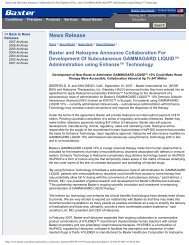IDF Patient & Family Handbook for Primary Immunodeficiency ... - IDFA
IDF Patient & Family Handbook for Primary Immunodeficiency ... - IDFA
IDF Patient & Family Handbook for Primary Immunodeficiency ... - IDFA
Create successful ePaper yourself
Turn your PDF publications into a flip-book with our unique Google optimized e-Paper software.
Chronic Granulomatous Disease 35<br />
Treatment of Chronic Granulomatous Disease (continued)<br />
CGD can be cured by successful bone marrow<br />
transplant, but most CGD patients do not seek<br />
this option. This may be because they lack a<br />
fully tissue matched normal sibling, or because<br />
they are doing well enough with conventional<br />
therapy that it is inappropriate to assume the risks<br />
associated with transplantation. But it is important<br />
<strong>for</strong> that subset of CGD patients who do have<br />
constant problems with life threatening infections<br />
to know that bone marrow transplantation could<br />
be a treatment option. Gene therapy is not yet an<br />
option to cure CGD. However, some laboratories<br />
are working on this new therapy and gene therapy<br />
might be an option in the future.<br />
Many physicians suggest that swimming should<br />
be confined to well chlorinated pools. Fresh<br />
water lakes in particular and even salt water<br />
swimming may expose patients to organisms<br />
which are not virulent (or infectious) <strong>for</strong> normal<br />
swimmers but may be infectious <strong>for</strong> CGD<br />
patients. Aspergillus is present in many samples<br />
of marijuana, so CGD patients should be<br />
discouraged from smoking marijuana.<br />
A major risk to CGD patients is the handling of<br />
garden mulch (shredded moldy tree bark); this<br />
type of exposure is the cause of a grave and<br />
life-threatening <strong>for</strong>m of full lung acute inhalation<br />
Aspergillus pneumonia. Households with CGD<br />
patients should never use garden mulch at all if<br />
possible and CGD patients should remain indoors<br />
during its application in neighboring yards. Once<br />
the mulch is settled firmly on the ground and is not<br />
being spread or raked, it is much less of a danger<br />
to CGD patients. <strong>Patient</strong>s should also avoid<br />
turning manure or compost piles, repotting house<br />
plants, cleaning cellars or garages, per<strong>for</strong>ming<br />
demolition <strong>for</strong> construction, dusty conditions, and<br />
spoiled or moldy grass and hay (including avoiding<br />
“hay rides”). Since early treatment of infections is<br />
very important, patients are urged to consult their<br />
physicians about even minor infections.<br />
Expectations <strong>for</strong> the Chronic<br />
Granulomatous Disease <strong>Patient</strong><br />
The quality of life <strong>for</strong> many patients with Chronic<br />
Granulomatous Disease (CGD) has improved<br />
remarkably with knowledge of the phagocytic<br />
cell abnormality and appreciation of the need<br />
<strong>for</strong> early, aggressive antibiotic therapy when<br />
infections occur. Remarkable improvements in<br />
morbidity and mortality have occurred in the last<br />
20 years. The great majority of CGD children can<br />
expect to live into adulthood, and many adult<br />
CGD patients hold responsible jobs, get married<br />
and have children. However, most CGD patients<br />
remain at significant risk <strong>for</strong> infections and must<br />
take their prophylaxis and be vigilant to seek early<br />
diagnosis and treatment <strong>for</strong> possible infection.<br />
Recurrent hospitalization may be required in CGD<br />
patients since multiple tests are often necessary<br />
to locate the exact site and cause of infections,<br />
and intravenous antibiotics are usually needed<br />
<strong>for</strong> treatment of serious infections. Disease-free<br />
intervals are increased by prophylactic antibiotics<br />
and treatment with gamma interferon. Serious<br />
infections tend to occur less frequently when<br />
patients reach their teenage years. Again it must<br />
be emphasized that many patients with CGD<br />
complete high school, attend college, and are<br />
carrying on relatively normal lives.
















